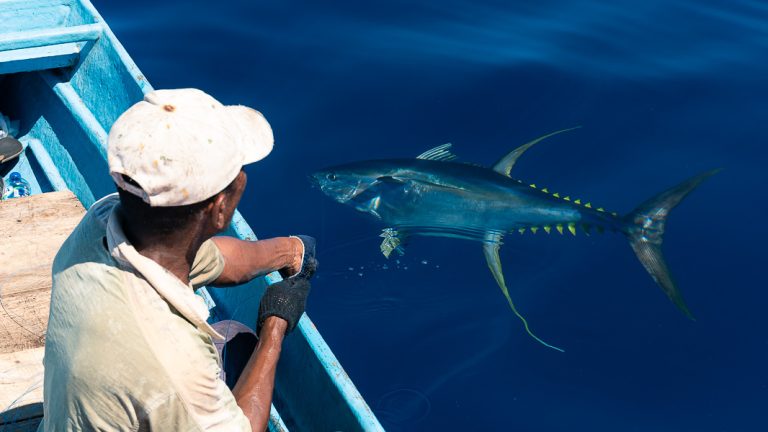
One-by-one is a collective term that incorporates pole-and-line, handline and troll line fishing methods. This way of fishing is highly selective and is environmentally sustainable, socially responsible and supports local economies.
One-by-one tuna fishing is a traditional way of fishing; it has been practiced for hundreds of years by many coastal communities throughout the world. These fishing methods have been passed down from generation to generation, they bring families together through fishing.
Throughout coastal communities all over the world, hundreds of small-scale fisheries are hard at work every day using these ancient fishing methods to catch tuna, one fish at a time. These fisheries, which are small-scale in the size of their operations and their current market reach, produce some of the most responsibly-caught and sustainable tuna in the world. They practice one-by-one fishing, a technique that uses one hook and one line to catch one tuna at a time, which has wide-ranging environmental, social, and economic benefits.
One-by-one tuna fishers use their catch to feed their local communities as well as supplying international markets with export of tuna products. These fisheries play a vital role in the global tuna supply chain, especially when considering the growing demand for ethically sourced and eco-conscious consumer products.
Since one-by-one fishers cause little harm to the waters in which they fish, positioning these fisheries for market success can create significant environmental benefits. One-by-one fishing provides social and economic well being for local coastal communities as a whole as explained in the Socio-Economic Assessment of the Tuna Fisheries in the Maldives, The roles of women in Maldivian one-by-one tuna supply chains: A scoping study, and St Helena Social Wellbeing Report
Discover the different techniques and gear types around the globe and read about the countless benefits of one-by-one fishing.
“I’ve been fishing since I was eleven years old and will continue until my body decides to retire. I can feed my family by working as a fisherman. With pole-and-line, we purposefully use hooks that are too big for baby fish, which ensures that we only catch fish that are mature.”
~ Arnold Barauntu, Bitung, Sulawesi, Indonesia